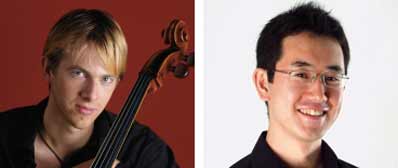|

James Barralet (solo cello) Hiroaki Takenouchi (solo piano)
Ligeti Sonata for solo cello (1984-53)
Kodály Sonata for solo cello Op. 8 (1915)
Bach-Busoni Nun komm, der Heiden Heiland BWV659
Alexei Stantchinsky Piano Sonata in G (1912)
Beethoven Piano Sonata in C minor Op. 111 (1822)
Wigmore Hall 19 January 2009
Nothing very new in this shared recital by PLGYA artists, but both musicians offered novelties. Ligeti's early cello solo sonata is clearly influenced by Kodaly & Bartok; the second of the two movements was more individual, with its melody 'buried in an unstoppable torrent of notes' which James Barralet took in his stride. Kodaly's sonata, the first solo cello work of real significance since Bach's, has held its place in this repertoire, and was as absorbing and exciting as always. Barralet has a flair and commitment which makes for strong communication with his audience to which we supporters of PLG present responded warmly.
Hiroaki Takenouchi, whom we have followed since 2004, was more aloof and his choices did not make for so persuasive a second half. One is always glad to see Busoni's name on a programme listing; but less so coupled with Bach's ! The complicated ornamented setting of Nun komm, der Heiden Heiland - 'so elaborate that it is hard to trace the original tune' - needed a singing top line which eluded Takenouchi on the Wigmore Steinway. And the beginning of the short-lived Stantchinsky's last Piano Sonata (1912) - 'characterised by almost overpowering intellectualism, especially the abundant use of counterpoint' - was, at first, too similar. We failed to find it as transcendent and revelatory as the pianist hoped we might; on this showing we are still to be persuaded that this composer (1888-1914) was heading towards 'one of the greatest composing careers of his time' before his untimely early death. Takenouchi is a wide-ranging, exploratory pianist and had rethought the tempi relationships in Beethoven's Op 111 according to suggestions from Barry Cooper's new edition, but on this occasion he did not quite reach 'the elevated mathematical bliss and enraptured spiritual simplicity' we were enjoined to expect.
Do explore our reviews of Hiroaki Takenouchi's very desirable recordings of Jeremy Dale Roberts, Dillon and Roxburgh.
Peter Grahame Woolf
|



